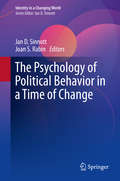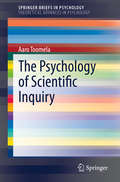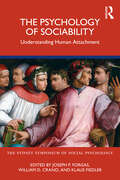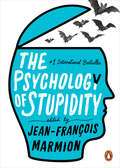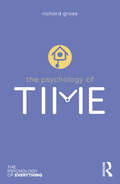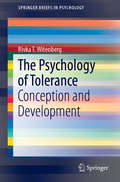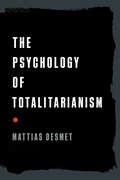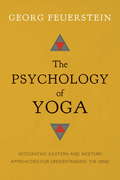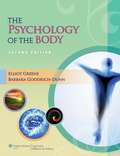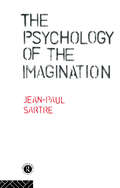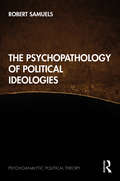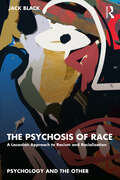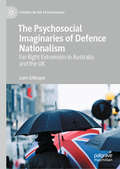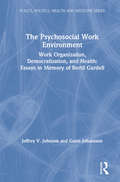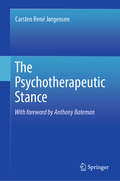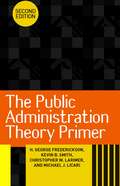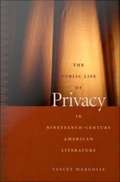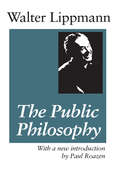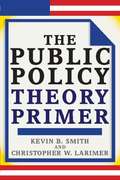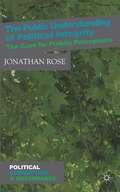- Table View
- List View
The Psychology of Political Behavior in a Time of Change (Identity in a Changing World)
by Jan D. Sinnott Joan S. RabinThis volume seeks to add a unique perspective on the complex relationship between psychology and politics, focusing on three analytical points of view: 1) psychology, politics, and complex thought, 2) bio/psycho/social factors of masculinity and power, and 3) underlying factors in political behavior. Contributors examine recent political events worldwide through a psychological lens, using interdisciplinary approaches to seek a deeper understanding of contemporary political ideas, psychologies, and behaviors. Finally, the book offers suggestions for surviving and thriving during rapid political change. Among the topics discussed: Biopsychological factors of political beliefs and behaviorsUnderstanding political polarization through a cognitive lensImpact of psychological processes on voter decision makingMotivations for believing in conspiracy theoriesNonverbal cues in leadershipAuthoritarian responses to social changeThe Psychology of Political Behavior in a Time of Change is a timely and insightful volume for students and researchers in psychology, political science, gender studies, business and marketing, and sociology, as well as those working in applied settings: practitioners, government workers, NGOs, corporate organizations.
The Psychology of Scientific Inquiry (SpringerBriefs in Psychology)
by Aaro ToomelaThis brief sets out on a course to distinguish three main kinds of thought that underlie scientific thinking.Current science has not agreed on an understanding of what exactly the aim of science actually is, how to understand scientific knowledge, and how such knowledge can be achieved. Furthermore, no science today also explicitly admits the fact that knowledge can be constructed in different ways and therefore every scientist should be able to recognize the form of thought that under-girds their understanding of scientific theory. In response to this, this texts seeks to answer the questions: What is science? What is (scientific) explanation? What is causality and why it matters? Science is a way to find new knowledge. The way we think about the world constrains the aspects of it we can understand. Scientists, the author suggests, should engage in a metacognitive perspective on scientific theory that reflects not only what exists in the world, but also the way the scientist thinks about the world.
The Psychology of Sociability: Understanding Human Attachment (Sydney Symposium of Social Psychology)
by Klaus Fiedler Joseph P. Forgas William CranoThis edited volume brings together the latest research in understanding the nature, origins, and evolution of human sociability, one of the most intriguing aspects of human psychology. Sociability—our sophisticated ability to interact with others, imagine, plan, and execute interdependent behaviours—lies at the heart of our evolutionary success, and is the most important prerequisite for the development of increasingly elaborate civilizations. With contributions from internationally renowned researchers in areas of social psychology as well as anthropology and evolutionary psychology, this book demonstrates the role of social psychology in explaining how human sociability evolved, how it shapes our mental and emotional lives, and how it influences both large-scale civilizational practices and intimate interpersonal relations. Chapters cover the core psychological characteristics that shape human sociability, including such phenomena as the role of information exchange, affective processes, social norms, power relations, personal relationships, attachment patterns, personality characteristics, and evolutionary pressures. Featuring a wide variety of empirical and theoretical backgrounds, the book will be of interest to students and researchers in all areas of the social sciences, as well as practitioners and applied professionals who deal with issues related to sociability in their daily lives.
The Psychology of Stupidity
by Liesl Schillinger Jean-Francois Marmion"We need books like this one." --Steven PinkerAt last, stupidity explained! And by some of the world's smartest people, among them Daniel Kahneman, Dan Ariely, Alison Gopnik, Howard Gardner, Antonio Damasio, Aaron James, and Ryan Holiday.And so I proclaim, o idiots of every stripe and morons of all kinds, this is your moment of glory: this book speaks only to you. But you will not recognize yourselves...Stupidity is all around us, from the coworker who won't stop hitting "reply all" to the former high school classmate posting conspiracy theories on Facebook. But in order to vanquish it, we must first understand it. In The Psychology of Stupidity, some of the world's leading psychologists and thinkers--including a Nobel Prize winner and bestselling authors--will show you... • why smart people sometimes believe in utter nonsense; • how our lazy brains cause us to make the wrong decisions; • why trying to debate fools is a trap; • how media manipulation and Internet overstimulation make us dumber; • why the stupidest people don't think they're stupid.The wisdom and wit of these experts are a balm for our aggrieved souls and a beacon of hope in a world of morons.
The Psychology of Time (The Psychology of Everything)
by Richard GrossWhat is the meaning of time? Do we have an internal clock? Can time speed up or slow down?The Psychology of Time considers how we define, describe, and experience time. From a discussion of how our language around time is dependent on metaphor, to the role of biology in controlling our bodily experience of time, the book delves into how the finitude of life is a given human experience. It looks at how we reflect on the passage of time throughout our lives, and how our experience of time can be influenced by diverse factors including our age, gender, health, and culture.Offering insights into something we are all immersed in, but often give little thought to, The Psychology of Time shows us how our understanding and experience of time can influence our everyday behaviour.
The Psychology of Tolerance: Conception and Development (SpringerBriefs in Psychology)
by Rivka T. WitenbergThis book offers a new standpoint to understanding tolerance to human diversity by approaching it from the perspectives of cognitive, developmental and prosocial psychology. Emphasising the positive aspects of social perception and behaviour, it invites readers to re-consider ‘tolerance’ not simply as the opposite of prejudice, but as something that can in fact coexist with prejudice and intolerance. Drawing on original empirical research conducted with children, adolescents and young adults, the book maps the response patterns for tolerant judgement and justification, including psycho-developmental factors. It explains how tolerance regarding differences of colour, creed and culture is based on underlying beliefs that guide the reasoning process to support judgements about human diversity. Showcasing emerging theory and a new methodology of data collection that goes beyond common approaches, this book outlines a unique potential developmental trajectory for tolerance to human diversity based on fairness, empathy and reason. The book challenges students, researchers and general readers across the fields of psychology, human ethics and moral philosophy with its new insights into the character of prosocial beliefs.
The Psychology of Totalitarianism
by Mattias Desmet&“This is an amazing book . . . [Desmet is] one of the true geniuses I&’ve spoken to . . . This book has really changed my view on a lot.&”—Tucker Carlson&“[Desmet] is waking a lot of people up to the dangerous place we are now with a brilliant distillation of how we ended up here.&”—Robert F. Kennedy, Jr.The world continues to exist in the grips of mass formation—a dangerous, collective type of hypnosis—as we bear witness to loneliness, free-floating anxiety, and fear giving way to censorship, loss of privacy, and surrendered freedoms. It is all spurred by a singular, focused crisis narrative that forbids dissident views and relies on destructive groupthink.Desmet&’s work on mass formation theory was brought to the world&’s attention on The Joe Rogan Experience and in major alternative news outlets around the globe. Read this book—now in paperback, ebook, and audiobook—to get beyond the sound bites!Totalitarianism is not a coincidence and does not form in a vacuum. It arises from a collective psychosis that has followed a predictable script throughout history, its formation gaining strength and speed with each generation—from the Jacobins to the Nazis and Stalinists—as technology advances. Governments, mass media, and other mechanized forces use fear, loneliness, and isolation to demoralize populations and exert control, persuading large groups of people to act against their own interests, always with destructive results.In The Psychology of Totalitarianism, world-renowned Professor of Clinical Psychology Mattias Desmet deconstructs the societal conditions that allow this collective psychosis to take hold. By looking at our current situation and identifying the phenomenon of &“mass formation&”—a type of collective hypnosis—he clearly illustrates how close we are to surrendering to totalitarian regimes.With detailed analyses, examples, and results from years of research, Desmet lays out the steps that lead toward mass formation, including:An overall sense of loneliness and lack of social connections and bondsA lack of meaning—unsatisfying &“bullsh*t jobs&” that don&’t offer purposeFree-floating anxiety and discontent that arise from loneliness and lack of meaningManifestation of frustration and aggression from anxietyEmergence of a consistent narrative from government officials, mass media, etc., that exploits and channels frustration and anxietyIn addition to clear psychological analysis—and building on Hannah Arendt&’s essential work on totalitarianism, The Origins of Totalitarianism—Desmet offers a sharp critique of the cultural groupthink that exists throughout society. He cautions against the dangers of our current cultural landscape, media consumption, and reliance on manipulative technologies and then offers simple solutions—both individual and collective—to prevent the willing sacrifice of our freedoms.&“We can honor the right to freedom of expression and the right to self-determination without feeling threatened by each other,&” Desmet writes. &“But there is a point where we must stop losing ourselves in the crowd to experience meaning and connection. That is the point where the winter of totalitarianism gives way to a spring of life.&”&“One of the most important books I&’ve ever read.&”—Ivor Cummins, The Fat Emperor Podcast
The Psychology of Yoga: Integrating Eastern and Western Approaches for Understanding the Mind
by Georg Feuerstein"Psychoanalysis itself and the lines of thought to which it gives rise," said C. G. Jung, "are only a beginner's attempt compared to what is an immemorial art in the East"--by which he was referring to the millennia-old study of the mind found in Yoga. That tradition was hardly known in the West when the discipline of psychology arose in the nineteenth century, but with the passing of time the common ground between Yoga and psychology has become ever more apparent. Georg Feuerstein here uses a modern psychological perspective to explore the ways Hindu, Buddhist, and Jaina yogas have traditionally regarded the mind and how it works--and shows how that understanding can enhance modern psychology in both theory and practice.
The Psychology of the Body (LWW Massage Therapy and Bodywork Educational Series)
by Elliot Greene Barbara Goodrich-DunnThe Psychology of the Body provides massage therapists, bodyworkers, and other professionals who use contact with the body with a greater understanding of the psychological issues that can arise from using touch in their therapy sessions. This new edition continues to provide a crucial basis of knowledge for students, recent grads, and experienced therapists alike regarding the emotional impact of effective therapy. The book describes the connection between the body and the mind, how touch affects this connection, the client's emotional reaction and release, and how to respond to the client in an appropriate manner. With a new, more colorful layout, this new edition has 50% more content and has been fully revised to address the latest science around this topic. For instructors, prepare your students to appropriately identify, understand, and respond appropriately to all aspects of the therapeutic relationship, including the phenomenon of emotional release, dealing with boundaries, effective interpersonal communications, and a body-based approach to ethics. Furthermore, in-text features aim to help students apply their learning to actual practice. Teaching resources like power point presentations, lesson plans, and tests with answer keys are available.
The Psychology of the Imagination: A Phenomenological Psychology Of The Imagination (Routledge Classics Ser.)
by Jean-Paul SartreFirst published in 1972. Routledge is an imprint of Taylor & Francis, an informa company.
The Psychopathology of Political Ideologies (Psychoanalytic Political Theory)
by Robert SamuelsInspired by Freud’s The Psychopathology of Everyday Life, this book examines the unconscious processes shaping contemporary political ideologies. Addressing ten fundamental questions, Robert Samuels identifies four basic political ideologies: liberal, conservative, Left, and Right, which are often placed in the structure of a logical square, determined by two binary oppositions, with a fifth structure of centrism complicating the square. He turns to psychoanalysis to explain the unconscious defense mechanisms that structure these political ideologies. Each chapter uses a recent, influential title as a gateway to the analysis of the ideologies and structures identified. Through this analysis, Samuels argues that belief in ideological structures is tied to triumvirates of institutions and ideals; conservatives being tied to premodern institutions of religion, feudalism, and monarchy, while modern liberals are tied to ideals of universality, objectivity, and empiricism. He concludes that this investment in universality shapes the ethics of modern globalization and democratic liberalism. Unlike other books, conclusions are reinforced through examples drawn from current events with an integrated model of different psychopathologies. The Psychopathology of Political Ideologies moves beyond providing an understanding of what drives different political investments, to offer a more rational and conscious comprehension of subjectivity and social organization. This book will be a great resource for those interested in politics, political science psychology, social psychology, globalization, and ideology.
The Psychopathology of Political Ideologies (Psychoanalytic Political Theory)
by Robert SamuelsInspired by Freud’s The Psychopathology of Everyday Life, this book examines the unconscious processes shaping contemporary political ideologies.Addressing ten fundamental questions, Robert Samuels identifies four basic political ideologies: liberal, conservative, Left, and Right, which are often placed in the structure of a logical square, determined by two binary oppositions, with a fifth structure of centrism complicating the square. He turns to psychoanalysis to explain the unconscious defense mechanisms that structure these political ideologies. Each chapter uses a recent, influential title as a gateway to the analysis of the ideologies and structures identified. Through this analysis, Samuels argues that belief in ideological structures is tied to triumvirates of institutions and ideals; conservatives being tied to premodern institutions of religion, feudalism, and monarchy, while modern liberals are tied to ideals of universality, objectivity, and empiricism. He concludes that this investment in universality shapes the ethics of modern globalization and democratic liberalism. Unlike other books, conclusions are reinforced through examples drawn from current events with an integrated model of different psychopathologies.The Psychopathology of Political Ideologies moves beyond providing an understanding of what drives different political investments, to offer a more rational and conscious comprehension of subjectivity and social organization. This book will be a great resource for those interested in politics, political science psychology, social psychology, globalization, and ideology.
The Psychosis of Race: A Lacanian Approach to Racism and Racialization (Psychology and the Other)
by Jack BlackThe Psychosis of Race offers a unique and detailed account of the psychoanalytic significance of race, and the ongoing impact of racism in contemporary society. Moving beyond the well-trodden assertion that race is a social construction, and working against demands that simply call for more representational equality, The Psychosis of Race explores how the delusions, anxieties, and paranoia that frame our race relations can afford new insights into how we see, think, and understand race’s pervasive appeal. With examples drawn from politics and popular culture—such as Candyman, Get Out, and the music of Kendrick Lamar—critical attention is given to introducing, as well as explicating on, several key concepts from Lacanian psychoanalysis and the study of psychosis, including foreclosure, the phallus, Name-of-the-Father, sinthome, and the objet petit a. By elaborating a cultural mode to psychosis and its understanding, an original and critical exposition of the effects of racialization, as well as our ability to discern the very limits of our capacity to think through, or even beyond, the idea of race, is provided. The Psychosis of Race speaks to an emerging area in the study of psychoanalysis and race, and will appeal to scholars and academics across the fields of psychology, sociology, cultural studies, media studies, and the arts and humanities.
The Psychosocial Imaginaries of Defence Nationalism: Far-Right Extremism in Australia and the UK (Studies in the Psychosocial)
by Liam GillespieThe Psychosocial Imaginaries of Defence Nationalism interrogates the emergence of far-right nationalist 'defence leagues' in Australia and the UK. Throughout the book, Liam Gillespie refers to these groups as defence nationalists: that is, as nationalists who imagine themselves as defenders of the nation and therefore national subjects par excellence. Drawing on original research, psychoanalytic and psychosocial theory—and particularly the work of Jacques Lacan—the author explores the narratives, imaginaries and subjectivities that sustain these groups, as well as the narratives, imaginaries and subjectivities these groups sustain. He argues that unlike other nationalist groups, defence nationalists are not primarily concerned with realising their avowed political projects. Instead, they are concerned with constructing and then enjoying themselves as the nation's self-ordained defenders. This means that which threatens the nation can paradoxically have a fortifying effect upon defence nationalists, legitimising and securing both the way they see themselves, and the position they see themselves occupying with/in the nation.The Psychosocial Imaginaries of Defence Nationalism will be of interest to anyone concerned with critical theorisations of contemporary nationalism, as well as with the application of psychoanalytic and psychosocial theory to social, cultural and political analysis.
The Psychosocial Impacts of Whistleblower Retaliation: Shattering Employee Resilience and the Workplace Promise
by Jacqueline Garrick Martina BuckThis book analyzes the harms related to whistleblower retaliation, its psychosocial impacts on employees, and the institutional dysfunction it creates and perpetuates. Stigma and biases against whistleblowers interfere with their ability to make protected disclosures when harm to others is at stake. Retaliatory toxic tactics create an atmosphere and corporate culture that embodies fear and encourages bystander behavior. In this book, the authors explore psychosocial impacts across domains that include financial, legal, social, physical, and emotional well-being. Ten of the 14 chapters specifically examine the toxic tactics of retaliation: gaslighting, mobbing, marginalizing, shunning, devaluing, double-binding, career blocking, counter-accusing, bullying, and doxxing. These toxic tactics are the building blocks of workplace traumatic stress (WTS) and can lead to posttraumatic stress disorder (PTSD), depression, substance abuse, and suicide. WTS is a term that differentiates between workplace violence or job stress, which can be components of WTS but do not fully describe the systemic hostile work environment that targets an employee. Understanding WTS and how it disrupts identity, causes moral injury, and shatters world views are important aspects for clinicians treating clients who are victims of this kind of hostile work environment. The Psychosocial Impacts of Whistleblower Retaliation is a useful resource offering a new way for social workers, mental health providers, advocates, and other support services professionals and practitioners to assist whistleblowers. It helps clinicians understand how to view patients suffering from whistleblower retaliation and gives them a lexicon for forensic evaluations. Lawyers, especially those specializing in employment, labor, and Qui Tam cases, also could benefit from having a means to describe the psychosocial impacts of retaliation and WTS on their clients when filing for compensatory damages for pain and suffering during judicial proceedings. Finally, the book could appeal to employees and managers, human resources professionals, victim rights advocates, elected officials, media personnel, and other professionals who are interested in learning more about whistleblower retaliation and its psychosocial and cultural implications.
The Psychosocial Work Environment: Work Organization, Democratization, and Health : Essays in Memory of Bertil Gardell (Policy, Politics, Health and Medicine Series)
by Jeffrey V. Johnson Bertil Gardell Gunn JohannsonDedicated to the late Bertil Gardell, a Swedish Social Scientist, this text comprises of 18 essays that shares a common vision - the impact of work on the interconnected processes of stress and disease.
The Psychotherapeutic Stance
by Carsten René JørgensenThis book provides a thorough critique of the dominating medical understanding of psychotherapy and argues for a dynamic relational understanding of psychotherapy, deeply founded in the most important results from empirical psychotherapy research. In the first part, the book critically examines the traditional focus on technical factors in psychotherapy based on available empirical research on the subject. It asks questions about whether specific techniques cure specific diagnoses or therapists and therapeutic relationships that cure persons. Part II of the book argues that the currently dominating medical understanding of psychotherapy must be challenged by a better understanding of psychopathology and psychotherapy that contextualizes the relationship between therapist and the patient. Overall, this book provides a new approach to some of the most important questions in psychotherapy and discusses what it means to think and work psychotherapeutically. The book is highly relevant for professionals in clinical/psychotherapy training and for advanced courses in psychotherapy, including courses on mentalization-based therapy, psychoanalytic psychotherapy and eclectic psychotherapy.
The Public Administration Theory Primer
by Kevin Smith H. George Frederickson Christopher Larimer Michael LicariThis textbook offers updated, detailed descriptions of the key theories in contemporary public administration, from rational choice to postmodern approaches.
The Public Administration Theory Primer
by H. George Frederickson Kevin B. Smith Christopher W. Larimer Michael J. LicariThe Public Administration Theory Primer explores how the science and art of public administration is definable, describable, replicable, and cumulative. The authors describe several theories and analytical approaches that contribute to what we know about policy administration and consider which are the most promising, influential, and important--both now and for the future. The extensively updated second edition includes the latest directions and developments in public administration theory. These include the rise of reporting as a means to hold bureaucracy accountable, the continuing evolution of the "hollow state" or "shadow bureaucracy" and the rise of network theory, and new psychological and biological behavioral research with important implications for decision theory and rational choice. The contributions of nearly a decade's worth of new research are woven into all the chapters, in some cases altering conclusions about the health and robustness of certain popular conceptual frameworks.
The Public Life of Privacy in Nineteenth-Century American Literature
by Stacey MargolisStacey Margolis rethinks a key chapter in American literary history, challenging the idea that nineteenth-century American culture was dominated by an ideology of privacy that defined subjects in terms of their intentions and desires. She reveals how writers from Nathaniel Hawthorne to Henry James depicted a world in which characters could only be understood--and, more importantly, could only understand themselves--through their public actions. She argues that the social issues that nineteenth-century novelists analyzed--including race, sexuality, the market, and the law--formed integral parts of a broader cultural shift toward understanding individuals not according to their feelings, desires, or intentions, but rather in light of the various inevitable traces they left on the world. Margolis provides readings of fiction by Hawthorne and James as well as Susan Warner, Mark Twain, Charles Chesnutt, and Pauline Hopkins. In these writers' works, she traces a distinctive novelistic tradition that viewed social developments--such as changes in political partisanship and childhood education and the rise of new politico-legal forms like negligence law--as means for understanding how individuals were shaped by their interactions with society. The Public Life of Privacy in Nineteenth-Century American Literature adds a new level of complexity to understandings of nineteenth-century American culture by illuminating a literary tradition full of accidents, mistakes, and unintended consequences--one in which feelings and desires were often overshadowed by all that was external to the self.
The Public Philosophy
by Hans EysenckBegun in 1938 and completed only in 1955, The Public Philosophy offers as much a glimpse into the private philosophy of America's premier journalist of the twentieth century as it does a public philosophy.The basis of Lippmann's effort is ""that there is a deep disorder in our society which comes not from the machinations of our enemies and from the adversaries of the human condition but from within ourselves."" He also provides a special sort of legacy to liberalism in its broadest sense - as the root approach to human existence that could provide civility and accommodation against incivilities and extremism, and that uniquely stood against the totalitarian counter-revolutions from Jacobism to Leninism. This work is a masterful defense of the public philosophy as a constitutional tradition, and can be easily read as such today.Paul Roazen, long identified with the analysis of Lippmann's work, points out that no matter how trenchantly Lippmann dissected democracy, and the populist faith in the people's wisdom, he still sought to study the world in order to help govern it. His constant flow of journalistic writing had the educative intent of raising the level of the public's knowledge. His rationalist conviction that clearheadedness on public matters can be effectively relayed to people is nowhere more evident than in The Public Philosophy. In this sense it is an argument for the democratic ideal that people can be rallied in defense of the public interest.
The Public Policy Theory Primer
by Christopher Larimer Kevin B. SmithPublic policy has developed into a broad and interdisciplinary area of study. Research in the field tends to reflect this wide-ranging nature, with scholarly activity focusing on policy process, policy design, program evaluation, specific policy issues, and research classified simply as "policy studies." Yet, for those teaching and studying in the field, this disjointedness can be confusing and cumbersome. This text provides a reasoned and structured framework for the field of public policy. Authors Kevin B. Smith and Christopher W. Larimer not only discuss several major theories but also offer a consistent and coherent framework for uniting the field. This organized and comprehensive approach addresses core questions and concepts, major theoretical frameworks, primary methodological approaches, and key controversies and debates. The Public Policy Theory Primer is an indispensable text for the systematic study of public policy.
The Public Policy Theory Primer
by Christopher Larimer Kevin B. SmithPublic policy has developed into a broad and interdisciplinary area of study. Research in the field tends to reflect this wide-ranging nature, with scholarly activity focusing on policy process, policy design, program evaluation, specific policy issues, and research classified simply as "policy studies." Yet, for those teaching and studying in the field, this disjointedness can be confusing and cumbersome. This text provides a reasoned and structured framework for the field of public policy. Authors Kevin B. Smith and Christopher W. Larimer not only discuss several major theories but also offer a consistent and coherent framework for uniting the field. This organized and comprehensive approach addresses core questions and concepts, major theoretical frameworks, primary methodological approaches, and key controversies and debates. The Public Policy Theory Primer is an indispensable text for the systematic study of public policy.
The Public Policy Theory Primer
by Kevin B. Smith Christopher W. LarimerThis textbook for public policy students explains the fundamental concepts behind this emerging discipline, providing an integrated view of a field that is often marked by strong differences toward epistemology, methodologies and theories. Smith (political science, U. of Nebraska, Lincoln) and Larimer (political science, U. of Northern Iowa) approach this subject matter with the intent to clarify a "confusing and cumbersome" field, and they define the key issues of public policy such as its relationship with politics, the tools used to assess policy impact and how to implement these policies in the most effective manner. The introduction of scientific processes into the study of public policy is also reviewed. Annotation ©2009 Book News, Inc. , Portland, OR (booknews. com)
The Public Understanding of Political Integrity
by Jonathan RoseThrough detailed analyses of major and newly available datasets, this study examines the utility of a public probity-focused approach to understanding citizen disaffection with politicians. It shows that perceptions of public probity are coherent, substantively meaningful, responsive, and, most importantly, that they do matter.
